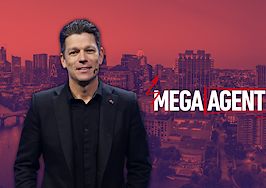No one can predict the future, but you can prepare. Find out what to prepare for and pick up the tools you’ll need at Virtual Inman Connect on Nov. 1-2, 2023. And don’t miss Inman Connect New York on Jan. 23-25, 2024, where AI, capital, and more will be center stage. Bet big on the roaring future, and join us at Connect.
After launching into Keller Williams’ Mega Agent Camp with a 35-minute keynote address touching on the housing market Tuesday, brokerage co-founder Gary Keller shifted to a more personal topic: The pursuit of agent happiness.
During remarks on the first day of the brokerage’s conference in Austin, Texas, the Keller Williams co-founder urged agents to drill down on faults and failures to find happiness to fuel future achievements. But he couldn’t resist mentioning a series of commission lawsuits in which the brokerage is named during the talk.
“Yeah, I’m happy. Screw ’em,” he said to an audience of Keller Williams agents, referring to lawsuits that could dramatically alter how agents are compensated, should plaintiffs declare victory. “I mean, if I did something wrong, I’m gonna pay for it. If I didn’t do something wrong, I might still be paying for it. I don’t care. You can take it all away, I don’t care. I don’t care. It means nothing to me.”
During his remarks, Keller used his presentation to bring up a PowerPoint slide that asked agents to identify their goals in life: Peace, health, love, productivity, success, wealth and happiness. After giving agents a moment to ponder what was most important to them, Keller said the pursuit of happiness was the most important one, as it often opens the doorway to many of life’s achievements.
“If you chose the word happy, it’s the only word that actually would encompass all of them,” he said.

Gary Keller
Although happiness is often reduced to butterflies and rainbows, Keller and Jay Papasan, the brokerage’s vice president of strategic content, said grasping happiness is a serious pursuit that requires agents to be honest about their faults, take personal and professional risks and be intentional about maintaining a good attitude, even when your back is against the wall.
“It’s about being intentional,” Papasan said. “You can be all of those things and not actually be happy. We know a lot of successful people and wealthy people that aren’t happy. You’ve got to make it an intention.”
“That’s exactly right,” Keller chimed in. “I don’t believe being happy happens on accident. As we talked about this we realize there’s a myth around happiness and many believe happiness is conditional. I will be happy if this happens. If this occurs, I’ll be happy. We set ourselves up for [heartache] when we make happiness conditional. Happiness is much bigger than that.”
Although he’s the co-founder and leader of one of the most recognizable real estate brands in the world, Keller said he has a lot he could be unhappy about, including the multimillion-dollar lawsuits involving buyer broker commissions. However, he said he’s decided to remain upbeat no matter the outcome.
“You can’t make me unhappy. Right? What a freedom,” he said. “I wake up right now and I think, correct me if I’m wrong Stacy, but I think I have about $1.3 billion in lawsuits on your desk right now with triple damages.”
Keller said he’s spent years learning to separate his happiness from life’s circumstances, with the divorce from his first wife and his father’s death being the catalysts for prioritizing his spiritual growth and development.
“Look, we’re all entitled to our emotions, right? We experience it as a reaction to our circumstances. We’re all entitled to that and it’s okay to be happy or sad. It’s okay to be elated or disappointed, proud or embarrassed, angry or calm,” he said. “But we get in trouble when we hold on to that. Holding on creates our disposition and our disposition is actually a choice. It’s your state of emotional being, and it should never be up for grabs.”
“I look at my father’s life. Look, I love my father. My father was unhappy on his deathbed. He refused to talk to me. He didn’t talk to me or my little sister,” he added. “He refused. He just sat there. And when we tried to talk, he’d go, ‘Shhh.’ He died having never said another word. He was unhappy, and I didn’t want to be like that.”
Keller said his resolve to be happy was tested in his 20s when he went through a divorce in the midst of a housing crash. The crash forced him into debt and into a therapist’s chair where he learned to prioritize and take ownership of his spiritual health.
“I was being driven by a bad self-image that said, ‘if I succeed, I’m going to feel good about myself.’ Then I had all these things happen to me,” he said. “I went to the psychiatrist, and I said, ‘Fix me fix me now’. He goes, ‘Okay, but we’re only going to talk about your ex-spouse once.'”
“I said, ‘How come?’ And he said, ‘Because it’s all your fault… I don’t know you that well, but you seem like a traditionalist. I’m gonna go out on a limb and ask, who asked who to marry who?'” he added. “I went, ‘Oh,’ and he said, ‘You asked the wrong person. We need to figure out why.'”
Throughout his therapy experience, Keller said he realized he’d lost his hustle. Although it was alarming at first, he said it opened the door to transforming real estate from something he did into something he loved.
“I don’t have to be successful to be happy. I don’t have to make money to be happy. I don’t need anything to be happy. I’m just happy,” he said. “I had this moment of panic where I went, ‘Oh my god, I’m screwed.’ When I realized that all physical life is meant to have spiritual outcomes, everything changed for me. Everything changed.”
“I became fearless. It didn’t matter what happened to me. You can’t touch my happiness. You can’t make me unhappy,” he added. “What a freedom.”
After that breakthrough, Keller said he realized the hustle first, happiness second formula didn’t work. “Happiness is actually a precursor of success,” he said. “It’s not merely the result of it.”
Keller, Papasan and Head of Industry and Learning Jason Abrams encouraged Camp attendees to prioritize happiness by investing in the people and experiences that will bring them joy well after their real estate careers end.
“In one of the longest studies out there, [sociologists] followed about 270 Harvard students starting in the 1930s,” Papasan said. “Some of them are still alive and they’re still following them today. They tracked them for what made them healthy, what made them happy and what made them successful.
“I think in 2018, they updated the study and they said, ‘If you want to know the single answer, it’s love.’ Full stop. Nothing mattered more to their success and happiness and health and longevity than how they managed their social relationships.”
Keller added, garnering a few laughs, “No one’s going to use their dying breath to say, ‘I just want to take one more listing.’ You’re not going to, you’re not going to say show me my checkbook balance one more time. You’re not going to do it. All that will matter to you is that you’re in harmony with the people that own your heart.”
While agents aim to get their “unfair share” of the market before 2023 closes, Keller said they need to fiercely guard their values by protecting their time.
“I time protect because it matters. Yes. Not because I’m trying to not be spontaneous,” he said. “I have taught John’s daughter, my granddaughter, that when music comes up it’s time to dance. That’s the one spontaneous thing I do.”
“Living a culture of hustle may get you success. It may not make you happy,” he added. “Living a culture of happiness is your best chance for happiness and success.”













